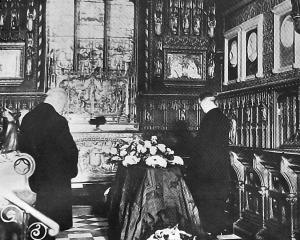
A Wānaka welcome is not extended to us all
Despite its million-dollar houses, Lake Hāwea has a failing sewerage system.
This was known before permission was granted to build 400 more houses, one among many housing developments being built in the township right now.
Perhaps the subject of sewerage is too gross for Queenstown Lakes District Council councillors and Wānaka board members, too smelly for their hot-house plant sensitivities.
Easier to blame the lack of planning on council operations. Perish the thought of taking responsibility for what happens in the organisation they are elected to guide.
Could it be they stood for election with pleasant visions of tourism promotion? Did they dream of prettying-up Wānaka lakeside, rather than having nightmares of sewage with nowhere to go?
Positive image is all. Take the McDonald’s location issue, strident concerns about the architecture and unhealthy food.
Come on. So, our supermarkets and Night ’n Day store sell only healthy food? And their buildings were designed by Gaudi? McDonald’s is considered lower class; that’s why it was shoved out of sight.
Wānaka area welcomes residents who own outsize houses, outsize cars and outrageous rental properties, and, of course, tourists with money. There is no embrace of people struggling to pay extortionate rent, or mortgages for that matter. Renters are necessary to service wealthy residents and tourists, but their struggles are ignored.
Social housing? That would suggest Wānaka depends on poverty for its fraudulent fun-town identity.
Unless our elected representatives want to continue to be dismissed as irrelevant, they must take responsibility . . . and accept it is for councillors to make decisions for council officers to carry out.
Pro-democracy
The messy Treaty Principles Bill was put to bed after National and New Zealand First said that they would not support it. The prime minister argued that the Bill only got to the select committee stage, as this was part of the coalition agreement between Act New Zealand and National.
It is interesting that New Zealand First would not support the Bill, as as part of its coalition agreement with National has a clause which states: "Pro-democracy — upholding the principles of liberal democracy, including equal citizenship, parliamentary sovereignty, the rule of law and property rights, especially with respect to interpreting the Treaty of Waitangi."
This clause, by the way, is also in Act’s coalition agreement with National and has exactly the same wording.
It would be a real worry to those who opposed the Treaty Principles Bill to see National honouring the pro-democracy clause and how and when they intend to do it.

How about you bring lake back to what it was?
This is another view of the Monowai power station 100-year anniversary (ODT 28.4.25). In the ratio of environmental pain for energy gain, the scheme must rank among the worst in the world. The pristine Lake Monowai was raised, with some 50km of shoreline forest drowned and all the lake beaches submerged. Why? For the operational convenience of having storage water for the tiny Monowai station.
Is it really necessary for Pioneer Energy to keep Lake Monowai in a flooded state? Pioneer has an opportunity to enter the history books by removing the Monowai dam and restoring the lake. What a great anniversary that would make 100 years from now.
Headline spurned
"Keep away from foolish and ignorant arguments — they end in quarrels" (Opinion 256.4.25). Really ODT? Washing a council’s dirty linen in public then hanging it on [the] line is one of the very few ways of holding councils to account. The advice from the ODT is a bit like ignore the wash cycle — go straight to spin. No thank you.
Why put stop sign up on speed limits?
Page 4 of the ODT (28.4.25) indicates that Dunedin City Council staff have amongst themselves decided to retain their currently imposed 24/7 30kmh speed limits around schools.
Everyone recognises the need for suitable restrictions and a safe environment around schools at pick-up/drop-off times, with the mass release of (mostly) excited children, not to mention their caregivers parked on yellow lines.
However, there seems little merit and, I suspect, little community support in applying 30kmh restrictions 24/7.
This reduces traffic at all hours to a road works speed, or that of a funeral cortege, outside of peak school hours when there is a complete absence of extraordinary risk.
These are, after all, commonly thoroughfares with traffic flow a primary intent and school safety needs should be contained to the brief periods they exist.
At what point do council staff consult the community in these matters?
They don’t ever appear to have done so in the wider sense and seem to have little mandate for their 24/7 rulings.
The same has applied to other ad hoc speed restrictions in some suburban areas and distributor routes, unrelated to schools, with no discernible need to the extent applied, generally unpopular and rather tellingly widely unrecognised by drivers.
It is unclear whether these are to be reviewed, but by and large they should be thrown out and hopefully in most cases will be, in accordance with current government policy which at least carries some measure of mandate, contrary to council staff who, at present levels of consultation, do not.
Address Letters to the Editor to: Otago Daily Times, PO Box 517, 52-56 Lower Stuart St, Dunedin. Email: editor@odt.co.nz












